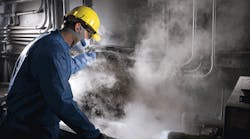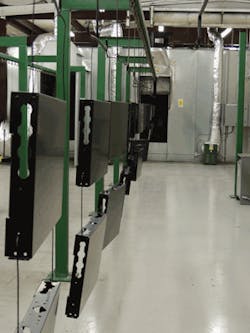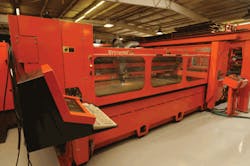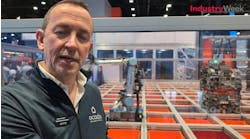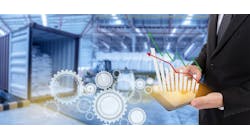Normally you wouldn't want to be exposed to something that's communicable and makes you turn green, but Bruce Hagenau welcomes this as a supply chain phenomenon. As president of Metcam, a precision fabricator of custom sheet-metal components and assemblies, he is dealing with more and more customers for whom being green will help you get more of their business. This green contagion is also known as sustainability, and Hagenau cites several OEMs who want their suppliers to join them in spreading it around. They include Carrier Corp., Siemens, Tyco and Steelcase Furniture.
See Also: Global Supply Chain Logistics Management
From its 120,000 sq ft plant in Alpharetta, Ga., Metcam ships tractor trailer loads of parts to Carrier's facility in Charlotte, N.C., and finished goods to Steelcase's distribution facility in Athens, Ala. and Tyco's distribution center in Atlanta. It also ships products to clients in India, China, Singapore, Netherlands, Mexico and Canada. In fact, transportation plays a big part in Metcam's sustainability scheme. It boils down to efficiency.
"Steelcase decided two and a half years ago to relocate some of its manufacturing outsourcing from the Great Lakes area to the southeast," Hagenau says, "and one of their key criteria in looking at fabricators in a four state area was to find one that had good sustainability programs."
Why it Makes a Difference
Metcam is one of the hundreds of suppliers Steelcase selected to help it meet its sustainability and lean goals. Initiatives include materials assessment, worker safety, avoidance of problem chemicals, energy and material reduction and technology and process improvements. The company wants its suppliers to collect information on materials, recycled content, worker processing, and transportation. Hagenau is all for it because it helps his company be more efficient and more competitive.
"To really measure sustainability in the supply chain you need to drill all the way back to raw material production of the product you're ultimately getting," he says. "There's an increasing focus and a move toward having that understanding."
In fact Hagenau believes his company's stance on sustainability has helped it to win customers over and bring business back from Mexico and China. The company is so passionate about this issue it hosted a "Manufacturing Day" at its factory last October to raise awareness of skilled career options and the importance of manufacturing to the U.S. economy.
After co-founding Metcam in 1989, Hagenau became a vocal advocate for reshoring, speaking around the country about environmental issues and sustainability— most recently on behalf of the U.S. Department of Commerce and the Georgia Department of Natural Resources. He's even won the business of European companies.
For example, Metcam's certification in the ISO 14000 environmental management system helped it win the business of Refusol, a German company that leads the world market in inverters for solar panel arrays. When this firm came to the U.S. looking for fabricators, the fact that Metcam was one of the few with ISO 14000 credentials won it the business.
ISO 14000 is a family of standards that address various aspects of environmental management. It is designed to help companies identify and control their environmental impact and improve their sustainability performance.
The Cost Factors
Sustainability extends to the air conditioning and lighting Metcam uses in its plant, as well as the waste it is no longer shipping to landfills and the amount of water it has reduced in its operations. These measures merited the Governor's Award for pollution prevention in the State of Georgia, and last year it received gold level partnership with the Georgia Dept of Natural Resources, joining the ranks of Lockheed Martin, Coca Cola and Delta Airlines in achieving that status.
Transportation is another important aspect of sustainability. For example, the products it is manufacturing for Tyco used to be manufactured in Toronto, Canada. Metcam's proximity to Tyco's distribution facility meant lower shipping costs. Hagenau also believes that logistics played a big part in Steelcase's decision to start manufacturing product in the Southeast and not ship all of it out of the Great Lakes area. But customers also want assurances that product movement inside Metcam's four walls is as efficient as their transport outside. ISO 14000 status is a good start, but more of Metcam's prospective customers are coming in to see for themselves.
"We've had potential customers bring in an audit team for a full day just to go through the activities in the sustainability area, just like they would for a quality or a financial audit on the business," Hagenau says. "Sustainability is rising in stature to match some of those other areas they're looking at. With regard to material handling and logistics aspects, they look at how lean you are. Are you wasting energy, materials and resources with a poor shop layout?"
Improving material flow, and thereby reducing the amount of forklift operating time, goes along with replacing foot traffic with efficient conveyor systems. These are lean approaches, and lean is synonymous with sustainable.
"From that standpoint we'll continue to evaluate ways we can lessen the impact our operation has on the environment and to the extent we can incorporate programs that involve logistics and material handling we certainly will evaluate that as well," Hagenau says.
That could mean reducing the amount of propane its forklifts use, in addition to cutting water and power usage, and reducing the amount of waste shipped to landfill. Those are key metrics he intends to measure on an annual basis, gauge the trends, then normalize those trends for the amount of energy used relative to the number of products it has produced. That relativity is important to keep in mind, especially if you have an increase in resource usage.
"You may have had a 10% increase in power usage, but if you've had a 30% increase in your output, your normalized trend is still the direction you want it to head," Hagenau concludes. "We'll set metrics and goals in those areas and that's part of our ISO audit—and what customers will ask about when they come in, just as they would ask about our continuous improvement programs on the quality side or our Kaizen projects on the lean side."
